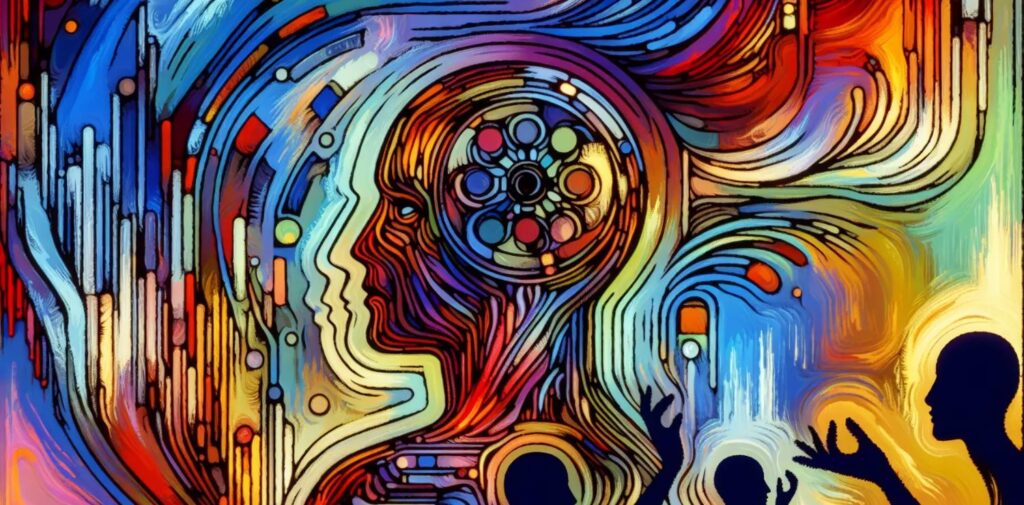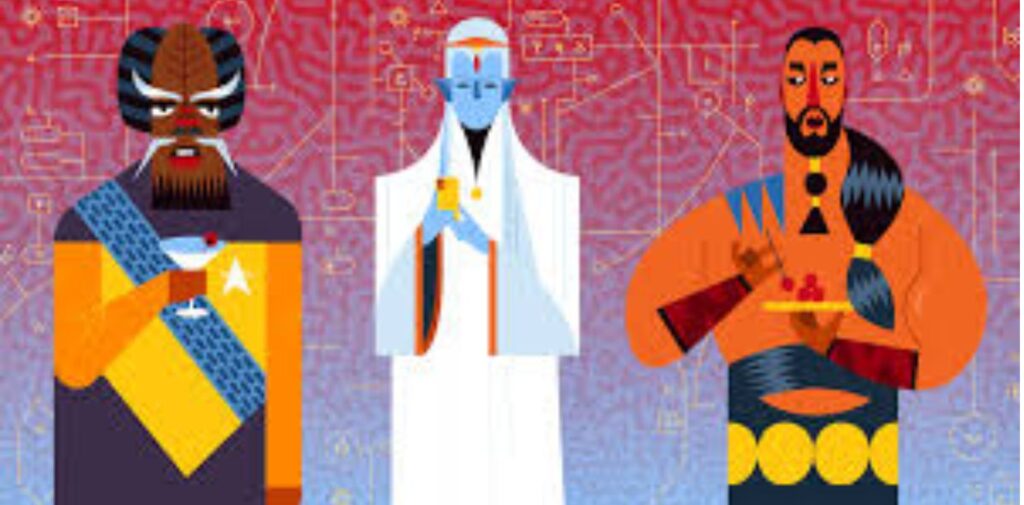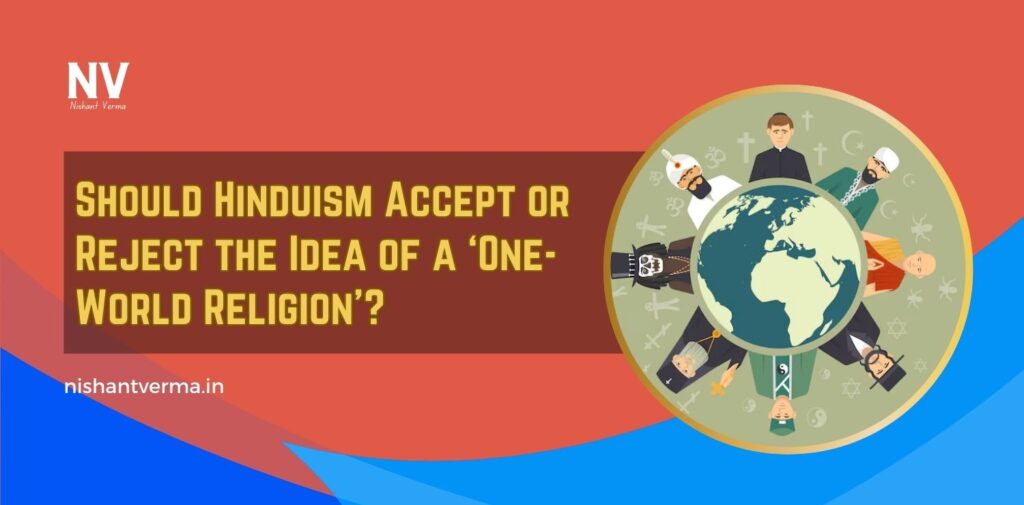The idea of a “One-World Religion” is a thought-provoking concept that has been discussed for centuries, gaining traction in various forms, especially in the modern world. This concept suggests that all religions could merge into a single global faith that unites humanity under a common spiritual framework. The idea is appealing to some, as it promotes peace, unity, and understanding between people of different cultures and beliefs. However, for others, the concept challenges the core values and diversity inherent in individual religions, including Hinduism. So, should Hinduism accept or reject the idea of a One-World Religion?
Let’s explore both sides of this debate.
Why Hinduism Might Accept the Idea of a One-World Religion
Hinduism Embraces Diversity
One of the unique features of Hinduism is its inclusive and diverse nature. Hinduism, unlike some other religions, does not have a single founder, single sacred text, or a rigid set of doctrines. It accepts a vast range of beliefs and practices, from worshipping multiple gods to following different paths of spiritual practice (like karma yoga, bhakti yoga, and jnana yoga). Hinduism, in many ways, already reflects the idea of a “One-World Religion” because it is open to many different beliefs and philosophies.
Hinduism’s ancient scriptures, such as the Upanishads and the Bhagavad Gita, emphasize the unity of all life and the idea that there are many paths to the same truth. In this sense, Hinduism might be seen as a precursor to the concept of a One-World Religion. The Rig Veda speaks of “Ekam sat vipra bahudha vadanti,” which translates to “Truth is one; the wise call it by many names.” This reflects the idea that all religious paths can lead to the same ultimate truth, making the acceptance of a unified world religion possible in Hindu thought.
Moreover, Hinduism has a long tradition of spiritual pluralism, where different philosophies, sects, and practices coexist peacefully. The philosophy of Sarva Dharma Samabhava (the equal respect for all religions) is integral to Hinduism. Hindu leaders like Mahatma Gandhi have championed the cause of religious harmony and unity, suggesting that the world could benefit from accepting religious diversity rather than promoting religious rivalry.
Global Unity and Peace
In a world increasingly affected by political conflicts, climate change, and social unrest, a One-World Religion could serve as a powerful tool for fostering global peace. Hinduism, with its emphasis on ahimsa (non-violence) and dharma (righteous living), could potentially help bridge the gaps between different religions and cultures. The teachings of Hinduism encourage tolerance, compassion, and understanding — values that could contribute to a peaceful global society.
A unified spiritual framework might also help eliminate the “us vs. them” mentality that divides societies based on religious differences. Hinduism’s openness to multiple spiritual truths could make it easier for people from various religious backgrounds to find common ground.

Why Hinduism Might Reject the Idea of a One-World Religion
Respecting Religious Diversity
While Hinduism is open to multiple paths, it also deeply values the distinctness of different spiritual traditions. The rejection of a One-World Religion could stem from the understanding that each religion offers a unique perspective on life, divinity, and the universe. By reducing all religions to a single global faith, there’s a risk of erasing the individuality and richness that each tradition brings to the world.
Hinduism itself is highly diverse, with numerous gods, philosophies, and practices. To force all of this into a singular framework might dilute its essence. Hinduism does not claim to have the “one true” path to God but instead respects the multiple ways people can experience the divine. Forcing all religions into one system could be seen as undermining the very concept of religious pluralism that Hinduism values.
Spiritual Autonomy
The core of Hindu spirituality lies in personal liberation (moksha) and the pursuit of truth, which can take different forms depending on the individual’s understanding and experience. Hinduism teaches that there are multiple paths to spiritual fulfilment, and each person is free to follow the path that resonates most deeply with them.
The idea of a One-World Religion might infringe on this personal autonomy. Spirituality is not a one-size-fits-all experience, and imposing a universal set of beliefs might stifle individual spiritual growth. Hinduism encourages each person to find their way to the divine, whether through devotion, knowledge, meditation, or selfless action. A unified world religion could undermine this freedom of choice, leading to a more uniform and less personalized spiritual practice.

The Danger of Universalization
Another concern is that the idea of a One-World Religion might pave the way for religious homogeneity, where the diversity of beliefs and practices is erased in favour of a single worldview. The core strength of Hinduism lies in its adaptability and its ability to absorb various influences over thousands of years. However, the imposition of a single religion could lead to the loss of cultural and religious diversity, resulting in a world that’s less vibrant.
Religious traditions around the world are shaped by the unique cultures and histories of their followers. The idea of one religion for the entire world may fail to honour the specific needs, values, and customs that different communities hold dear. Hinduism’s rich cultural heritage, with its festivals, rituals, and practices, could be diminished if it were absorbed into a larger, monolithic global religion.

In Conclusion: What Do You Think?
The idea of a One-World Religion has both positive and negative aspects when viewed through the lens of Hinduism. On the one hand, Hinduism’s openness to multiple spiritual paths could make it seem like a natural ally for a global faith. Its values of peace, tolerance, and unity could help foster a world that is more connected and harmonious. On the other hand, Hinduism’s deep respect for religious diversity, personal spiritual freedom, and the unique richness of individual faiths suggests that a One-World Religion might not be the best fit.
At the end of the day, the question is whether such a unity is desirable, or whether it might compromise the very diversity and individuality that makes Hinduism (and other religions) so unique.
What do you think? Should Hinduism embrace the idea of a One-World Religion, or should it hold on to the value of spiritual diversity? Share your thoughts and opinions!




